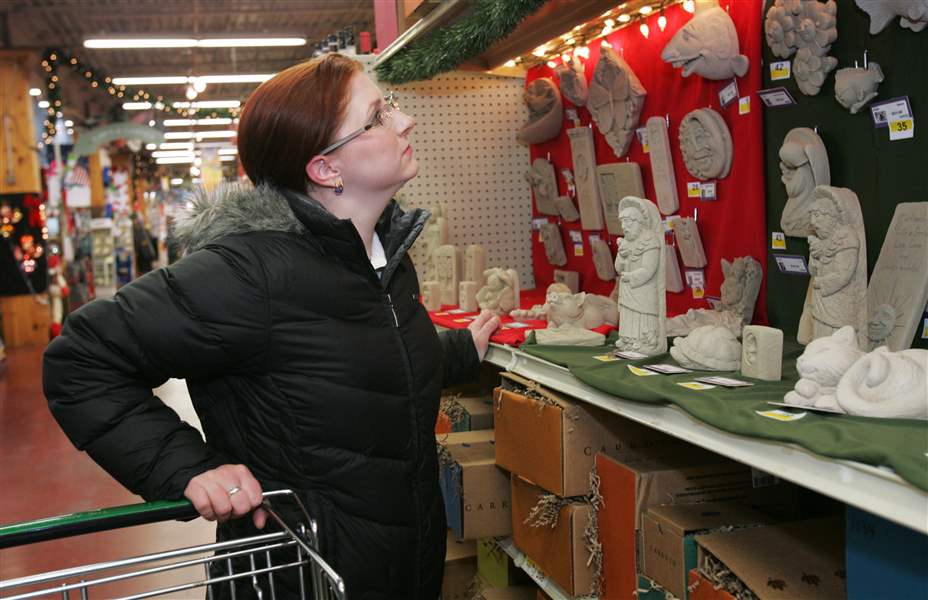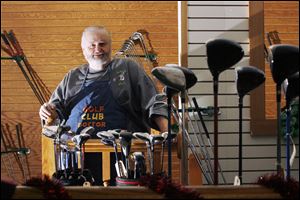
Economic slump lifts buy-local movement
12/13/2009
Shopping at The Andersons, Amelia Contreras of Toledo considers items from the Carruth Studios of Waterville.
Jetta Fraser

Shopping at The Andersons, Amelia Contreras of Toledo considers items from the Carruth Studios of Waterville.
Marita Schneider said it hit her about six months ago, in the middle of the mayoral campaign, as the candidates discussed the perils of the local economy in her West Toledo neighborhood.
“I hadn't ever thought about it in the past, but this year, with the way the economy is, I'm shopping in local stores,” she said as she bought Christmas presents this week in the Libbey Glass outlet downtown. “You want to support the businesses that make up Toledo and that support all of us. That's why I'm here.”
Unfortunately, for many retailers, Mrs. Schneider is an anomaly in the consumer world — someone who looks beyond bargains to consider the impact of their purchases.
But like Mrs. Schneider, a global economic downturn has many consumers reconsidering how they spend their holiday dollars, and whether spending on local products or in local businesses might bring a benefit back to them.
Buying services and patronizing restaurants are great ways to keep local funds in the local economy, said Don Grimes, an economist with the University of Michigan's Labor Institute.
Unlike most consumer electronics, which are now assembled overseas, when a homeowner hires someone to refinish a hardwood floor or paint a house, the vast majority of the money is likely to be recycled into the local economy.
And many restaurants make it a point to serve locally produced produce and farm products, which are primarily purchased from local vendors, Mr. Grimes said.

Todd Bloom, in business since 1971 as the Golf Club Doctor, lets customers know that if problems arise with a golf club he has built, ‘I'm going to take care of it.' His business is in Maumee.
Stacy Mitchell is a senior researcher with the Institute for Local Self-Reliance, a Minneapolis nonprofit that promotes the economic benefits of supporting local independent businesses. Studies on buying local give varied estimates of impact.
But she added: “They generally find that spending $100 at a locally owned business generates about $45 in local economic activity compared to $14 from spending $100 at a national chain.
“The main reason for the difference is pretty common sense: Local businesses tend to have a higher local payroll, and the most important difference is that local businesses are buying all their goods and services from other local businesses.”
George Mokrzan, chief economist with Huntington Bancshares in Columbus, said buy-local programs certainly help communities, but how much depends on the size of the area.
“In terms of supporting the jobs in one's area, there is a benefit to that,” he said. “It does make a difference buying from local retailers. It means local employment, it means local establishments are getting cash flow and earnings. If one supports local businesses, that could make a difference.”
If every employed person in the four-county metro Toledo region spent $100 extra per year in local stores instead of chain stores, it would add $28.9 million in revenues to local businesses. Using Ms. Mitchell's formula, that would keep $13 million in the local economy versus the $4 million spent at chain stores.
If the same held true across the 16-county region in northwest Ohio, local stores would receive an additional $71 million annually, of which $32 million would remain local versus $9.9 million spent in national chain stores.
Todd Bloom knows something about buying local. He's been known as the Golf Club Doctor since 1971, selling custom-fitted clubs from his store in Maumee. He said buying goods from local retailers is about more than the item a customer may purchase; it's about building a lasting relationship. “I always tell everybody that I own the company, I build the clubs, I do the fittings, and if you have a problem, I'm going to take care of it,” he said.
Aside from patronizing service places, such as eateries and locally owned stores, buying for Christmas from local manufacturers is a bit trickier.
Factories and companies in the region make Jeep Wranglers and Libbey glassware, but they also make Whirlpool dishwashers and washing machines, Calphalon cookware, Sauder Woodworking furniture, and Swan Creek candles, just to name a few.
Prices of those locally made potential gifts range from almost $22,000 for a Wrangler to $5 for a set of Libbey tumblers at the glassmaker's downtown outlet store.
“Cars make great gifts,” joked Lisa Schaaf of the Ohio Manufacturers' Association. Members of her organization make a wide variety of products, from prosthetics to automobiles to cleaning supplies to foodstuffs — but they don't make a lot of things that one might traditionally put under the Christmas tree.
“Unfortunately, most of those things are made in China now,” Ms. Schaaf said.
The Ohio Department of Development keeps a list of Ohio-made products and the companies that make them, but relatively few are items that typically make it on a Christmas wish list.
Still, there are local businesses that offer plenty of locally made holiday gifts. Sandusky-based Cedar Fair LP, for example, is once again offering season passes for next year for the holidays, including options to defer payment until March 1.
Though its sales reach has grown internationally over the last 25 years, Carruth Studios in Waterville gets about 40 percent of its annual sales from local consumers, Deb Carruth said. And the Christmas shopping season “is critical for us, just as it is for all retail,” she said.
Local residents “come to Garden Smiles because it's a fun place to come, but also because George [Carruth, the artist] is a local boy, and they're sending that piece of Toledo somewhere else. It's special to us to see that and hear it. It means a great deal.”
Urging people to spend their money locally is nothing new: Local merchants have used the strategy for decades as a way to compete with national retail chains.
In Toledo, as in many cities, merchants form and support “buy local” groups and initiatives, especially during the peak holiday shopping season, to varying success.
“I think that a lot of people like to be aware of it, but in the end, price and convenience get in the way,” said Elissa Schmidt of Taste of Toledo Gift Baskets & Gifts. For more than two decades, the suburban Toledo company has packaged and sold gift baskets of Toledo-made food products, shipping them domestically and abroad either on behalf of local businesses or to former residents now living elsewhere.
Toledo Choose Local is a 2-year-old organization that was formed specifically to explain the importance of buying from local stores.
“It's something that's in the interest of the entire community, not just the retailers,” spokesman Stacy Jurich said. The organization, which just finished its annual “Buy Local” week promotion, said it's not trying to persuade consumers to spend all of their money in locally owned stores on locally made products, but even a little bit helps.
“If every household in Lucas County redirected $100 a year to spending locally, it would add $8 million to the local economy,” she said.
A study earlier this decade of local versus chain bookstores in Austin found that of $100 spent in each store, the community impact of the local store was $45. But spent at chain stores, just $13 stayed in the community.
Yarder Manufacturing Co. has been doing custom metal work in Toledo for more than a century and has sold to consumers since 2005. Matt Yarder's YM Custom Grates makes cooking surfaces for grills that have college logos etched into them, and the holiday season is when business is cooking.
“Christmas is by far our biggest season for these,” he said. Most of his sales are over the Internet, he said, but he's gotten a good amount of business from local consumers since his products have been displayed in The Andersons general stores. “It was great tying into their local stores.”
The Andersons, based in Maumee, makes a point of featuring locally produced products in its retail stores, said Rick Swank, director of merchandising for company's retail group.
“We certainly look for opportunities to buy and promote local products where the supplier can meet our vendor criteria,” Mr. Swank said. “When we identify products as locally made in our stores, customers definitely respond positively to that.”
Artistic touches
Perhaps the easiest way to buy local for the holidays may be by supporting the arts — even the heavy ones.
Steve Loch is one of many local artisans who rely primarily on local consumers to support his business, Concrete Art and Crafts on North Holland-Sylvania Road in Sylvania Township. Though the holidays aren't his busiest season, the sales he makes this month help hold him over.
He has been casting and selling concrete lawn decorations since 1992 and buys all of his supplies locally because he wants to keep his money in the local economy. But when he tries to impart that lesson to his customers, it's hit or miss.
“You can tell people how important it is, but most people don't care, unfortunately,” Mr. Loch said.
“They just want to know if you've got what they want. I wish it did matter to more people.”
Contact Larry P. Vellequette at:lvellequette@theblade.comor 419-724-6091.